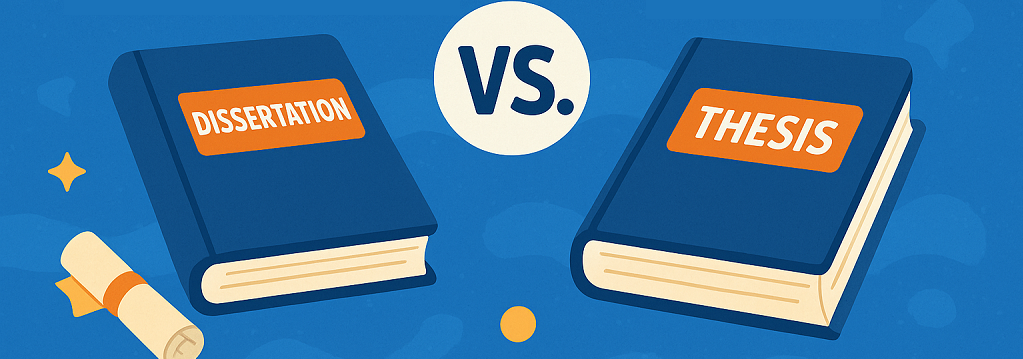
In academic settings, the terms “Dissertation” and “Thesis” are often confusing, leaving students wondering if they refer to the same thing or different scholarly milestones. A dissertation typically completes a PhD, and a thesis usually crowns a master’s degree. A master’s thesis is usually 50–100 pages, while a PhD dissertation is 200-300 pages, depending on the field of study and different program requirements. Understanding their differences is crucial for success and goes beyond being merely an academic detail. They vary in scope, length, structure, components, and other aspects. Because it is shorter, easier to pronounce, and easier to remember, the term “thesis” is commonly used by students. This article guides those pursuing graduate and postgraduate studies by elucidating these differences.
Dissertation vs Thesis: Purpose and Scope
A significant difference between thesis and dissertation is their purpose and scope. In many countries, a PhD degree is typically completed with a dissertation, an original piece of research that generates original knowledge that advances a discipline. It requires identifying a research gap, developing new theories/models, and doing extensive research. Think of it as a doctoral student’s masterpiece, seeking the title of Dr.. Writing it is a time-consuming process that usually requires 3-5 years of doctoral study, depending on the country. Completing it is like reaching the summit of a mountain after years of climbing. It is an accomplishment on both a personal and professional level.

The thesis, however, usually crowns a master’s degree. It demonstrates a student’s ability to apply research methods, analyze data, and engage with existing research to contribute modestly to their field. It often focuses on a narrower research question and can be completed within 1-2 years. This difference in scope makes the dissertation more complex, lengthier, and intellectually demanding. A dissertation or thesis represents years of arduous labor, restless nights, and personal growth for many.
Thesis vs Dissertation: Length and Contribution
Length and contribution highlight the most obvious differences. A master’s thesis usually ranges from 15,000 to 30,000 words (50–100 pages), depending on the field of study and different program requirements. Its contribution lies in demonstrating research competence rather than reshaping the field. A PhD dissertation, however, often exceeds 60,000 words (200 to 300 pages), reflecting years of research and a significant intellectual contribution. The goal is to present original findings, theories, or methodologies that advance knowledge within the discipline. PhD dissertations are also subjected to rigorous defense processes, requiring candidates to demonstrate expertise before a panel of experts.
Dissertation vs Thesis: Originality and Novelty
A dissertation’s primary objective is to create opportunities where none previously existed. It necessitates innovative research that emphasizes originality, which must be verified through a formal research proposal defense meeting, typically held one to two years after the start of your PhD program. It serves as a presentation in which students outline their research plans to a committee of experts, such as the main supervisor, co-supervisor(s), advisors, PhD committee chair, and external referees (if applicable). The primary goal is to convince the committee that the research topic is original and that the proposed milestones are achievable. The name of this formal defense varies by country; for example, it is referred to as the “1st-year confirmation” in many Australian universities.

On the other hand, master’s students assess prior research to develop a cohesive argument in a thesis. It is less about revolution and more about mastery of a field. It gives literature reviews precedence over analysis. It is a launching pad for more in-depth research in the future. In addition to master’s coursework, it has a more stringent deadline and is typically completed in 1-2 years. Students select a topic, research it, and then write about it in a shorter form than a dissertation. Thesis defense is more of a dialogue than a trial by fire. It is a capstone experience rather than a career-defining event. Master’s candidates may feel more at ease knowing time is running out.
Thesis vs Dissertation: Variations by Country
Around the world, these terms have varied meanings. In the UK, a dissertation usually refers to a master’s project, while a thesis honors a PhD. In contrast, the doctorates and dissertations are equivalent in the US, Canada, and Germany. While the standard term at Australian universities is a PhD thesis (note: there is always a “dissertation vs thesis Australia” debate among students). This linguistic dance confuses international students. Imagine applying abroad and misjudging the requirements! Context is crucial, so always consult the program’s recommendations. It is an odd twist on academic jargon. Imagine a confused Japanese master’s student in London who used the master’s dissertation term instead of the master’s thesis. Local peculiarities are reminders to be inquisitive and flexible.
Dissertation vs Thesis: Structure and Components
Both documents share a similar structure: abstract, introduction, literature review, methodology, data collection, results, analysis, conclusion, and future outlook. However, the difference between dissertation and thesis in this context is that the level of detail varies. A master’s thesis typically has a concise literature review and a straightforward methodology that applies established techniques. The results are presented with limited interpretation. Here is an example for “Abstract” and “Future Perspectives” sections of a PhD thesis in Australia (title: Harnessing the power of the Fenton reaction in RAFT polymerization technique):
Abstract Section
Polymer scientists have been attempting to synthesize tailored polymers with predetermined molecular weight, composition, architecture, and molecular weight distribution by moving from traditional free radical polymerization (FRP) to reversible deactivation radical polymerization (RDRP) techniques, i.e., atom transfer radical polymerization (ATRP), reversible addition-fragmentation chain transfer (RAFT) polymerization, and nitroxide-mediated polymerization (NMP). Redox-activated FRP initiated by a classical chemical reaction (i.e., Fenton reaction) has been extensively used for the synthesis of different monomers and the fabrication of various polymeric materials.
The Fenton reaction describes the reduction process of hydrogen peroxide (H2O2) by ferrous ions (Fe2+), generating highly reactive hydroxyl radicals. Despite its unique features, such as high reaction speed and cheap reagents, Fenton chemistry was not employed for the initiation of RDRP methods. This PhD project proposes the application of the Fenton reaction for initiating the RAFT technique at ambient conditions. The presentation is organized by the manipulation of H2O2 and Fe2+ sources and the type of monomers. This work leads to the synthesis of well-controlled linear homo- and co-polymers with different polymer chain lengths.
In the 1st part, the Fenton reaction was introduced to the RAFT process for the first time, termed as Fenton-RAFT polymerization, as an “on-demand” chain growth method. The ultra-fast Fenton–RAFT technique resulted in well-defined hydrophilic polymers with high monomer conversions (~75%) within 1 min at room temperature. The study on the polymerization rate and polymers’ characteristics in the presence of air showed oxygen-tolerance of the Fenton-RAFT system with good control over polymers’ size.
The 2nd part of this study directly addressed the drawbacks of the Fenton-RAFT process (i.e., non-affordable full conversions and presence of metal ions) by replacing synthetic H2O2 and inorganic source of Fe2+ with two proteins, i.e., glucose oxidase (GOx) and hemoglobin (Hb). Biologically activated Fenton-RAFT polymerization was termed Bio-Fenton-RAFT. Since Bio-Fenton-RAFT successfully led to the synthesis of well-defined polymers with full conversion values in either water or biological media, a RAFT polymerization catalyzed by real red blood cells was attempted. The Bio-Fenton-RAFT and blood-catalyzed Fenton-RAFT systems showed excellent tolerance towards oxygen and control over polymer chain lengths.
In the 3rd part, we used the capability of the GOx/Hb system via the Bio-Fenton-RAFT process for supplying initiating radicals to make ultra-high molecular weight (UHMW) polymers. This technique led to the synthesis of unprecedentedly large, well-controlled UHMW polymers with a molecular weight of 20 × 106 g/mol. The amount of GOx-generated H2O2 was detected to be ~3 mM in the reaction. To reduce the reaction time, Hb was replaced with ammonium ferrous sulphate. H2O2 was gradually injected and added to the reaction solution by using a syringe pump, leading to well-defined UHMW polymers after 2 h. Such controlled production of initiating radicals offers unique access to predefined UHMW polymer materials.
In the 4th part, I attempted to address the challenge (i.e., catalyst residuals) I faced in all previous Fenton-RAFT processes. To do so, I developed a heterogeneously catalyzed Fenton-RAFT technique by using Fe2+ metal-organic framework (MOF) particles, termed as MOF-Fenton-RAFT. In this methodology, synthetic H2O2 was used, and ammonium ferrous sulphate, commercial Hb, and native Hb were replaced with heterogeneous catalysts, Fe2+ MOF particles. The obtained results demonstrated that MOF-Fenton-RAFT is pH dependent, and acid-bearing RAFT agents play an important role in the rate of RAFT polymerization.
Future Perspectives Section
The ultrafast Fenton-RAFT polymerization described in Chapter 2 could be a potential option to define another PhD project for the synthesis of a library of polymers with a wide range of compositions, sizes, and architectures within a few minutes when taken into an automated and programmable polymerization platform. To achieve this goal, the main challenge in this study should be overcome first.
It was actually infeasible to achieve full conversions while keeping experimental molecular weights matched well with theoretical values, as the exothermic nature of the Fenton reaction led to the monomer evaporation when high concentrations of Fenton reagents were employed. Next step can be a careful optimization of the concentration of the Fenton reagents and operating conditions, such as controlling the Fenton reaction rate – for example, use of lower temperatures – we could attain near quantitative values.
Since Fenton-RAFT polymerization presented in Chapter 3 was successfully catalyzed by commercial Hb and native Hb from red blood cells in DI water and biological fluids, the Bio-Fenton-RAFT process is a great opportunity for prospective PhD students as it can be extended to other bio-relevant environments. For instance, H2O2 generated by cancer cells could be cascaded by Fenton reaction to form polymers in situ on the cells via the RAFT polymerization (or FRP).
All Fenton-RAFT polymerization methods presented in this PhD project are done in aqueous media, leading to the synthesis of hydrophilic polymers. To push the boundaries of the Fenton-RAFT technique, a potential plan for prospective PhD candidates could be an effort for the synthesis and formation of different hydrophobic polymers. To accomplish this purpose, the Fe2+ MOF particles reported in Chapter 5 can be exploited; despite the other sources of Fe2+ presented in the other chapters, they are soluble in various organic solvents.
Acrylate- and acrylamide-type monomers were polymerized well within all mentioned Fenton-RAFT polymerization approaches. However, Fenton-RAFT polymerization of methacrylate-type monomers resulted in uncontrolled polymers with high Ð values. A more detailed study by either using other CTA RAFT agents suitable for methacrylate monomers or new optimization of concentrations of the Fenton reagents is required.
The concept of electrochemical RAFT polymerization has been recently introduced by Matyjaszewski and co-workers. This could lead to an electrochemically activated Fenton-RAFT process whereby Fe3+ ions are used as precursor getting reduced back to Fe2+ ions by electron transfer process. Such technique will lower the rate of Fenton reaction, leading to a more controlled manner, which may result in getting full monomer conversion values.
A PhD dissertation, however, contains a comprehensive review of literature, often spanning multiple theoretical frameworks, followed by a detailed, often innovative methodology. The results section is more elaborate and is typically organized into three chapters, supported by in-depth analysis and critical discussion. Getting funding, accessing different labs, or going on fieldwork trips makes it more complicated. It is much bigger than a thesis and calls for perseverance in the face of setbacks, like failed experiments or elusive data. In this grind, the rewards are more valuable, and the stakes are higher. A defense (PhD viva), a public formal interrogation, finalizes the process.
Conclusion: Dissertation or Thesis
Understanding the differences between a dissertation and a thesis is essential for academic success. While both documents demand rigorous research, critical thinking, and scholarly writing, their scope, originality, and purpose vary greatly. A master’s thesis proves a student’s ability to apply research methods and analyze existing knowledge, while a PhD dissertation contributes entirely new ideas to the academic field. Their structures may appear similar, but the depth, length, and expectations differ. Students preparing for graduate or postgraduate study should carefully review their program’s requirements to avoid confusion. Ultimately, both represent milestones of academic growth and achievement. Generally, the term “thesis” is used more frequently by students because it is shorter, easier to pronounce, and easier to remember.
Frequently Asked Questions (FAQs)
What is the main difference between dissertation and thesis?
A thesis usually completes a master’s degree, while a dissertation is required for a PhD and contributes new knowledge to the field.
How long is a master’s thesis compared to a PhD dissertation?
A master’s thesis is typically 15,000–30,000 words (50–100 pages), while a PhD dissertation may exceed 60,000 words (200–300 pages). As a general rule, consider approximately 300 words per page on average for double spacing.
Do both a dissertation and thesis require original research?
Not necessarily. A thesis demonstrates research competence and analysis of existing work, whereas a dissertation must provide original contributions.




0 Comment